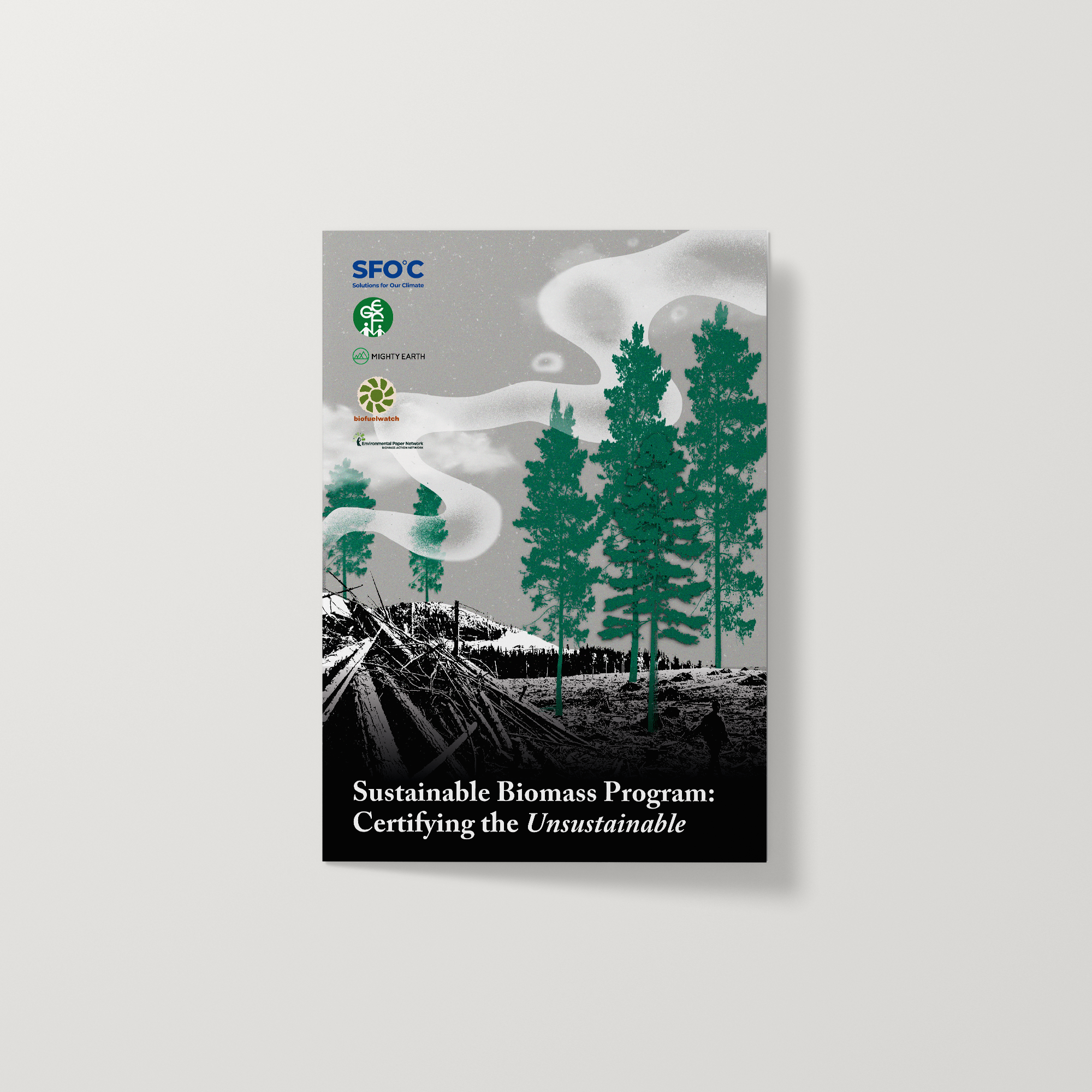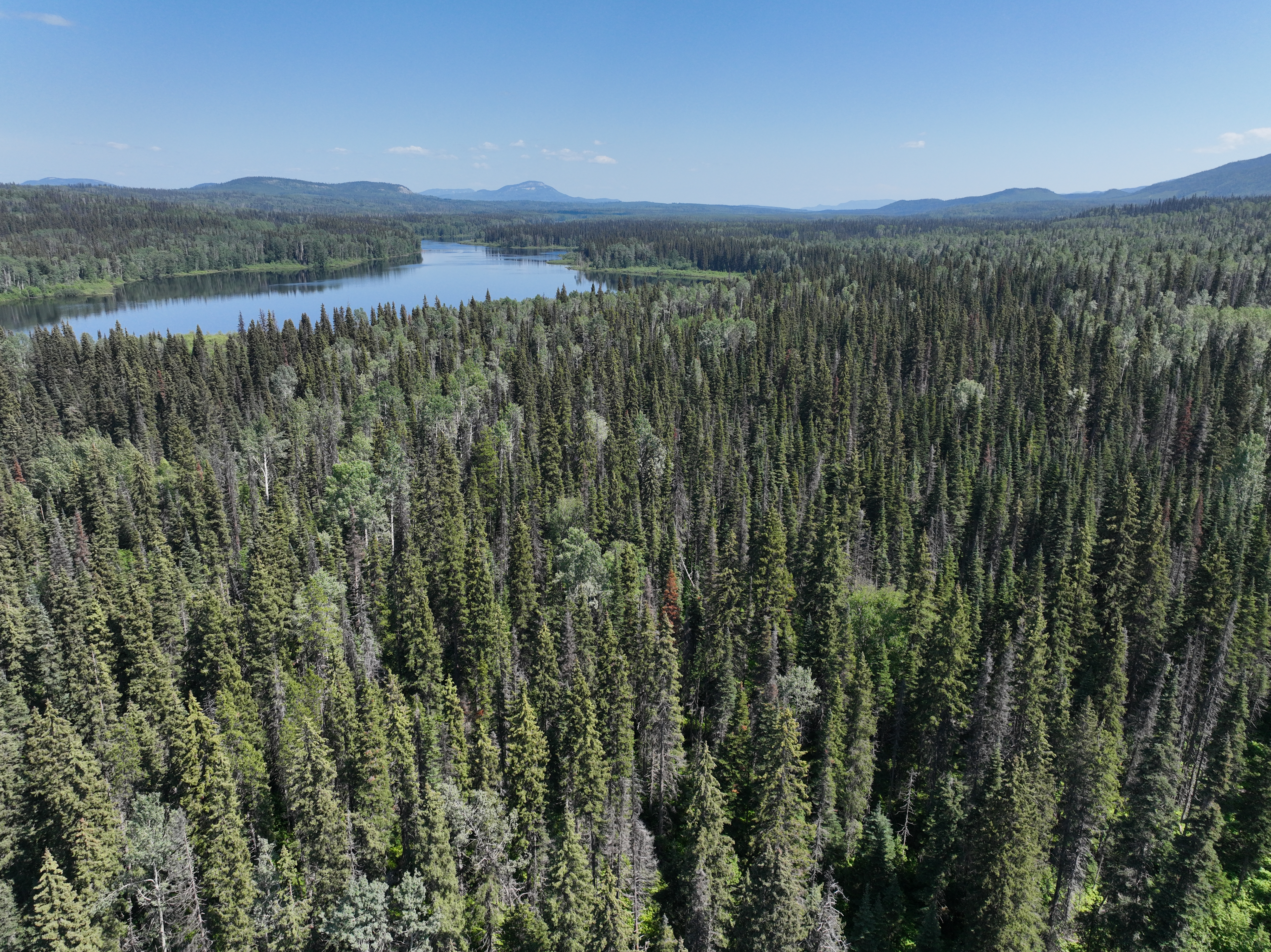World’s largest biomass certifier allows forest destruction and rising emissions under the guise of clean energy
July 31, 2025 (SEOUL, TOKYO, LONDON) – A new international report released today warns that forests worldwide are being cut down and burned for energy, and falsely labeled as “sustainable.” The Sustainable Biomass Program (SBP), the world’s most prominent certifier of biomass, is approving wood linked to forest destruction as climate-friendly fuel, despite science showing it emits more carbon than coal.
Power companies worldwide burn wood pellets for energy, while governments funnel billions in subsidies based on the false claim that forest biomass is low-carbon and sustainable. Nearly 100% of wood burned at the UK’s Drax Power Station, the world’s largest biomass plant, is SBP-certified, despite documented environmental impacts in the United States and Canada.
The report, “Sustainable Biomass Program: Certifying the Unsustainable”, uncovers that SBP enables destructive logging, greenwashes high-carbon biomass — all while helping energy companies claim they are going green. Over 85% of industrial wood pellets used in Europe are SBP-certified.
Authored by forest policy expert Richard Robertson and reviewed by Dr. Peter Wood, forestry faculty and lecturer at the University of British Columbia, the report reveals that the SBP routinely fails to protect nature, climate, and communities.
The report was jointly published by environmental organizations in the UK, Japan, and South Korea — the top three importers of biomass wood pellets — and comes amid growing criticism of each country’s continued support for forest biomass. The governments have begun rolling back support: the UK has halved subsidies for Drax Power Station, Japan has ended support for new large-scale biomass projects, and Korea is phasing out key incentives. Yet forest biomass remains heavily subsidized and central to national strategies, diverting public finance away from truly clean renewables like wind and solar.
A case study from British Columbia and Alberta, Canada, illustrates how these flaws result in the logging of primary and old-growth forests, with the wood later certified as "sustainable" under SBP.
The report outlines the following core failures:
No forest audits: SBP certifies wood pellet mills without site visits, relying on paperwork and using weak risk-based forest certifications (e.g., FSC/PEFC Controlled Wood) intended to avoid the worst forest practices, not to assess forest sustainability.
Carbon blind: SBP ignores smokestack emissions, allowing companies to offset immediate forest carbon losses with long-term recovery that may take decades.
Old-growth logging approved: SBP accepts wood from logged-over primary and old-growth forests, despite habitat degradation and high carbon impact.
No consent: SBP undermines the rights of Indigenous communities to say no to logging their forests.
Environmental groups behind the report are calling on governments to:
End subsidies for forest biomass and exclude it from renewable energy and green finance frameworks.
Prohibit sourcing from primary forests and Intact Forest Landscapes.
Treat biomass combustion emissions as identical to fossil fuel emissions in national and EU energy and carbon pricing policies.
Mandate due diligence on environmental and human rights impacts across all timber trade.
QUOTES
Richard Robertson, forest certification and governance expert (Canada):
“Our analysis shows that SBP certification fails even its own low bar for sustainability. Policymakers must stop using it to justify burning forest as a climate solution. It’s time for governments to move beyond weak certification schemes like SBP and promote forests as vital protectors of climate and biodiversity, not as fuel sources. The EU and UK and now Japan and South Korea must stop relying on SBP as a proxy for forest sustainability and drop biomass from renewable energy policy in line with their global climate and biodiversity commitments.”
Almuth Ernsting, Researcher and Campaigner at Biofuelwatch (UK):
“SBP serves no practical purpose other than to greenwash a highly destructive industry. It allows pellet and energy companies to claim they are ‘sustainable’ even if they source wood from the clearcutting of old growth and primary forests in Western Canada, from timber concessions in Malaysia that are linked to rainforest clearance and peat drainage, or from coastal hardwood forests in the Southeastern USA that form a vital part of a global biodiversity hotspot.”
Sayoko Iinuma, Researcher at the Global Environmental Forum (Japan):
“The Japanese government’s fuel standards for biomass power generation recognize SBP as proof of sustainability, allowing power plants that burn these wood pellets to receive public subsidies. However, this report shows that SBP permits the mixing of uncertified wood, the use of raw materials from primary forests, and ignores the urgent emissions reductions needed to meet the Paris Agreement targets. Despite clear evidence that biomass energy increases greenhouse gas emissions and degrades forest biodiversity, SBP merely paints it as ‘sustainable.’ We hope this report contributes to reducing public support for high-carbon, low-efficiency biomass power.”
Hansae Song, Forests & Land Use Lead at Solutions for Our Climate (South Korea):
“For over two decades, wealthy nations have poured renewable energy subsidies into the false solution of forest biomass, burning the world’s last remaining forests at the exact moment we need them most. Relying on biomass leads to degraded forests, delayed energy transitions, and rising emissions. Asia’s emerging economies must not repeat these mistakes. This report makes clear: there is no such thing as ‘sustainable biomass’ at scale. Governments must resist industry attempts to hijack climate policy and show real progress heading into this year’s global climate negotiations.”
Matt Williams, Senior Forest Advocate at Natural Resources Defense Council (global):
“SBP — a scheme set up by the biomass industry itself — has never been anything more than bioenergy companies marking their own homework. In the UK we know that burning trees in power stations isn’t good for the planet — just look at Drax in Yorkshire, the world’s largest biomass power plant. Burning the world’s forests can never be sustainable, no matter what labels it has: cutting down the Earth’s lungs stops them absorbing carbon and makes climate change worse. Calling forest biomass sustainable is climate racketeering worth billions.”
Roger Smith, Japan Director at Mighty Earth (global):
“Indigenous Peoples are the best protectors of the forests we all rely on as carbon sinks to help cool our rapidly warming world, and yet SBP largely ignores the rights of those communities to say no to logging on their lands. SBP also overlooks the impact of wood pellet production on impoverished black communities in the US Southeast who suffer serious health problems from air pollution from the pellet plants. SBP’s inadequate approach is failing people, destroying forests and propping up a biomass industry that is not carbon neutral, it’s a carbon nightmare.”
Peg Putt, Coordinator at Biomass Action Network, EPN International (global):
"The fig leaf that SBP certification represents can no longer protect big biomass from exposure. Governments and energy retailers must recognise and act upon the fact that concerns about climate impacts, destruction of natural treasures, and failure to uphold human rights throughout the supply chain of wood fueled energy are real and not conveniently dispensed with by this dodgy certification as they have been keen to believe."
What is “biomass”?
Biomass energy refers to burning organic materials such as wood to generate electricity or heat. While promoted as renewable, scientists warn that burning trees releases more carbon dioxide (CO₂) than coal per unit of energy produced — and destroys forests that would otherwise absorb CO₂ from the atmosphere. Biomass is now undermining global climate and biodiversity goals — just as countries prepare new climate pledges ahead of COP30.
ENDS.
Solutions for Our Climate (SFOC) is an independent nonprofit organization that works to accelerate global greenhouse gas emissions reduction and energy transition. SFOC leverages research, litigation, community organizing, and strategic communications to deliver practical climate solutions and build movements for change.
For media inquiries, please reach out to Yi Hyun Kim, Communications Officer, yihyun.kim@forourclimate.org.
Share this insights











![[Webinar] International webinar on enhancing due diligence of forest risk commodities' supply chains in Asia](https://content.sfoc.tapahalab.com/images/research/sjGudme.jpg)



![[토론회] 한국형 녹색분류체계(K-Taxonomy), 무엇이 녹색경제활동인가](https://content.sfoc.tapahalab.com/images/research/bn8jdme.jpg)






